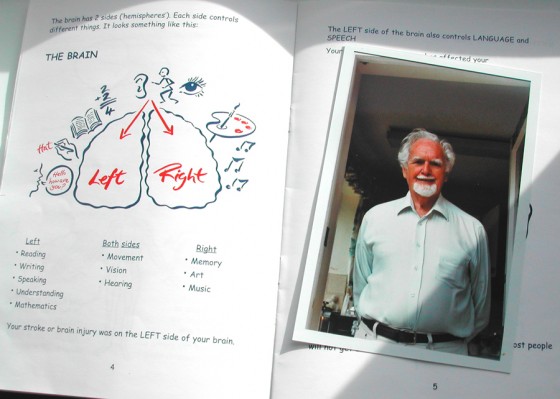My Dad doesn’t live in Baghdad but in a quiet street of Canterbury in the UK. What he meant to say was that the neighbour’s house was “flooded” (when the water tank burst last winter).
Silenced by a stroke
My father suffered a stroke in July and it has affected his speech. For one week after the stroke, he was almost completely silent. Gradually his speech is coming back. When someone asked him how he was feeling about three weeks after the stroke, he replied, “I feel organic.” (I see the word “organic” when I buy vegetables at the supermarket so perhaps my Dad was somehow saying that he felt like a vegetable!) Talking of supermarkets, he asked me recently while shopping, “Have you got pyjamas?” when he meant to say “Have you got bananas!” On another occasion, he said, “We ate at a convent,” when he really meant “at a restaurant”. He also asked me: “Have you switched off the Lord?” when he really meant “switched off the computer.” I guess this might be a subtle hint that I am devoting much of my life to staring into the light of a screen.
Amusing and confusing
His expressions can be amusing at times and a cause of confusion and frustration at others. What comes out is often a kind of poetry. In a normal conversation, he suddenly uttered a rather poetic phrase: “You encounter the cracks in the floor”, which I still don’t understand in the context of our conversation, but it sounds deep. He commented on a roofing contractor that he was “lifted by his perspicacity” – an uncommon word that means clarity. I have never heard him use this word before.
In a strange way, the stroke has given him a more vibrant vocabulary. Though it also makes him feel shy when talking to strangers because he hesitates to join in a conversation for fear of saying something stupid or silly.
The sides of the brain
His stroke illustrates what is going on in our brains and where. My father had a haemorrhage on the left side of his brain. The left hemisphere is the language centre of the brain and controls reading, writing, speaking, understanding and mathematics. The right hemisphere controls memory, art and music and is also thought to be the seat of creativity. Both hemispheres contribute to movement, vision and hearing.
Right brain thinking
Jill Bolte Taylor is a brain researcher and neuroanatomist who suffered a severe stroke at the age of 37 – also affecting the left side of her brain. It took her eight years to recover. She writes in her book “My Stroke of Insight” that she was forced to start using the right side of her brain more. She found that without the influence of her left brain thinking, she was much more able to tune into feelings of peace and contentment. She also became more intuitive. “When she was in the hospital as a patient, she said she could sense through her right brain when a nurse would come into the room and meant her well, or when the nurse was thinking about what time she was going to be off that day. She could sense the energy that was brought into the room.” (Source: Wikipedia.)
Perhaps we could all do with harnessing the right side of the brain more and not being such rational left brain human beings. I have heard that listening to someone speak while seeing them face-to-face encourages right brain learning while a predominantly visual stimulus such as the television stimulates the left-hand side of the brain and does not enhance memory. So the side of the brain we use has an influence on our powers of retention and the speed of learning. Luckily we don’t need a stroke in our left brain to be able to stimulate right brain thinking! All we need to be is a bit more playful, quiet, meditative, creative and to learn by listening to people face-to-face.
The tiger or the lion?
One of the difficulties my father now faces is the understanding of complex sentences. A stroke consultant put him to the test with the following sentence: “If a tiger is eaten by a lion, which animal is dead?” My father thought about if for a long moment and answered “The lion,” showing how his brain connectivity and logic are impaired, though when the right answer was pointed out, he was able to see his mistake.
Of course, any developing child provides a perfect illustration of right brain thinking. When I asked the same question about the lion and tiger to my 3-year-old niece, she answered without hesitation: “The bear.”

The photo is of my father John who has lost some of his usual ‘perspicacity’. The booklet shown is “Picturing Aphasia” by the charitable organisation Speakability. An estimated 150,000 people in the UK suffer from aphasia (impaired speech).
